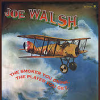Liverpool Sound and Vision Rating * * * *
It was the album that made Joe Walsh initially but as he and the band Barnstorm cut this record 40 years ago, he couldn’t have imagined what was just that little further down the road as one of the seminal groups in American music history came knocking for him.
The Smoker You Drink, The Player You Get sounds like a title that you could have at one stage suggested to one of the great guitarists of the 20th Century for his autobiography but instead is a genuine piece of Americana, a snapshot of band and more importantly of a musician who made the Eagles soar higher than ever before. Joe Walsh had already been in one semi-successful group, the James Gang and scored relative interest with their power trio riffs. However after a few years, including one notable gig at the Carnegie Hall, he formed Barnstorm, essentially a showcase for Joe as a solo artist and there his talent became even more noticeable. Reasonable sales for their debut album followed but by the time they released The Smoker You Drink, The Player You Get and the lead single was a commercial piece of good fortune and an inspired moment of rock music.
As lead in tracks to albums go, Rocky Mountain Way oozes Joe Walsh all over and the album couldn’t have had any better lead. The honesty and commitment to the music is quality throughout and Joe’s strangled delivery gives the song its directness, touching those who feel it with a sense of timelessness, with its connection to the harshness, abject loneliness and beauty of the mid-west and the mountain range that cuts through Colorado. Rocky Mountain Way is a love song to nature, something that rarely happens in rock music. However as always with the man who got his kicks being absolutely human there is a pay-off, yes he loves what he sees but he can’t help but relate this feeling for the Rocky Mountains he sees and feel somewhat in awe of them, his own music coming off second best as he compares rock music with the giant infront of him. He sings of being put out to pasture, a gentle play on words perhaps or a nagging feeling as he reflects of time with the James Gang.
The song also suggests a longing to reconnect with a time that has passed, the trail, the thrill of being completely away from it all except with a few buddies and friends and away from the life he has now got as he becomes a father and a husband. The call of the road is there as he sings ‘Time to open fire and we don’t need the ladies’. This is not a misogynistic view point; it is the call of a brother to another to hit the trail once more before time gets to catch up with all. Although still a young man at this point he had already lived a life that was packed and no doubt still felt the pull of it, no matter how content he was. The open fire suggests the tales and brotherhood, of a night under the stars as they made their way across country to perform in outback bars, to sing the songs by the roar of a fire. In essence a song that would suit his future band mates, Don Henley and Glen Frey down to the ground. It is not a stretch of the imagination why they incorporated it into the Eagles live set later on.
The further and deeper the listener goes into The Smoker You Drink, The Player You Get, the more the notion of restlessness, of wanting to get out from his life that he had become used to and go on the road, to search for the music, his soul once more. The dichotomy of his life, being a provider and a husband and of being one of the great guitarists of his time and the party animal that burning away inside of him, his friendship with John Belushi and The Who’s Keith Moon would become legendary in later years. The album title seems to sum up this confusion with the two activities become jumbled and mixed but above all the allusion to the words …The player you get, is it the playing of the guitar throughout this album that thrills him or was it being the player, the man, although brilliant, had a destructive side that once saw him do thousands of pounds of damage to a hotel room.
Impossible to dislike, the music that he created for this album is amongst some of the finest he ever made. Although a band album, it is essentially Joe Walsh declaring to the world that his guitar, his music will be talked about for years to come…he was proved right.
Ian D. Hall
